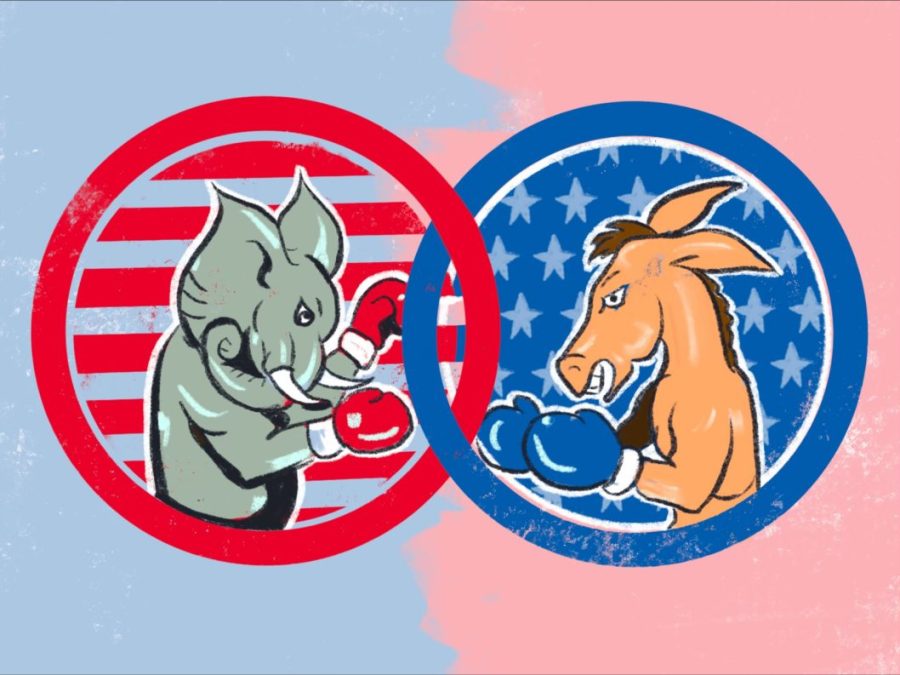Dueling Democracy
GOP potential gains spotlight the elephant in the room
By Bennett Cerullo ’23
The 2022 Mid-Term is going to be one of the most contested elections in recent history. Senate races in Pennsylvania, New Hampshire, Georgia, Ohio, and more will either solidify a Democratic hold on the Senate, or create a blockage to Biden’s presidency with a Republican victory. The catch? The Republicans cannot lose a single seat they already have as well as gain one. And the Democrats just need to win a single seat and hold the house to have a true majority in both houses and hold the White House.
According to a recent NPR/PBS Poll, 42% responding American adults strongly disapprove of Joe Biden’s presidency, where only 12% strongly approve, and 24% approve. Logically, with this data, it would likely mean that the possibility of a Republican victory this November is more likely than not. However, according to FiveThirtyEight, Republican candidates do not control a positive point advantage in any Democratic incumbent states. This is in contrast to the Democrats who hold control of majorities in Pennsylvania, and Georgia, who had a Republican in their seat until a special election in 2020. If the Democrats can win Pennsylvania in November, they will control the Senate with a true majority. In comparison the Republicans need to flip Nevada, Georgia, or New Hampshire and hold on to their current seats in order to hold a majority in the Senate.
According to the same NPR/PBS poll cited above, major issues this election are, based on most importance to the voter: inflation (30%), abortion (22%), health care (13%), January 6th committee hearings (9%), immigration (9%), and others (17%). Republican affiliated responders’ top two issues were inflation (40%), and immigration (22%). For democrats, it is Abortion (35%), followed by January 6th hearings (22%). Independents draw from both camps with their top two being inflation (37%) and then abortion (22%).
So, who are the big Republican candidates fighting for Senatorial seats? First, Pennsylvania. Mehmet Oz, celebrity physician and host of The Dr. Oz Show has been in public life for more than 20 years, since his successful heart transplant of Yankees manager Joe Torre, Frank Torre, during their 1996 World Series campaign. Since the early 2000’s Oz has held segments on many shows, addressing health issues. He has been overtly political since the 2016 election where hosted Donald Trump. In 2018, he was appointed a member of the President’s Council on Sports, Fitness, and Nutrition.
Herschel Walker, the Republican candidate in Georgia was a professional Football player, starting his career with stardom as a member of the University of Georgia Bulldogs. He played professional football from 1983 to 1997 where he rushed 8,225 yards. He will be running against Raphael Warnock of the Democratic party.
Other major Republican candidates include J.D Vance of Ohio, Blake Masters of Arizona, and Adam Paul Laxalt in Nevada.
So, the major question to be asked is, what will happen in the Senate? According to FiveThirtyEight, the Democrats take the senate in two of every three outcomes. In contrast, the Republicans may take the house with their two to three chances of winning the House of Representatives. However this ends, this election will have major ramifications for the next two years, and the election cycle in 2024.
What Midterms mean for the Democratic Party
By Nate Whittemore ’23
The US midterm elections in November do not look good. It seems likely that at least 10 seats will flip, losing possibly the house and or the senate to the Republican Party. There is historical precedent for the midterm elections to reflect the national feeling towards the sitting president; more often than not this involves the sitting president’s party losing one or both chambers of congress.
Inflation is one of the most talked about and followed issues facing the nation. It will likely be on the top of voters’ minds this November as they go to cast their ballot. The Democrats must contend with the record inflation, hit last summer, in four decades. While Biden’s landmark relief bill did help, it will likely be forgotten, at least partially by undecided voters. Inflation is fated to return the controllable levels as the supply chain finishes recovering from the massive disruptions of the COVID-19 pandemic.
The president himself comes under scrutiny in November. He has been polling incrementally better in the past few weeks; however, this will not move the needle enough to change the minds of the public. The Democrats hope that the Student Loan Relief Order, as well as the heretofore Inflation Reduction Act will get approved.
Illegal immigration, though not a large concern among Democrats in comparison to Republicans, is not to be downplayed this coming November. It remains a massively controversial issue across all political parties and will certainly have a role in how swing voters will vote. At the end of this fiscal year, the number of undocumented immigrants will surpass two million a year, a first in modern history for the nation.
Roe v. Wade is one of the most recent, most hot button issues for Americans today. Holding a level of importance adjacent to or more then the economic factors in November’s election, the overturn of Roe v Wade in June of last year has reflected poorly on the GOP. The outrage and controversy around the decision has not faded, with that controversy still fresh in pro-abortion undecideds, that may be the factor that outweighs the others. Recent opinion polls indicate that around 60 percent of Americans support abortion rights. If accurate that statistic could be a strong pull factor for the Democratic Party.



























